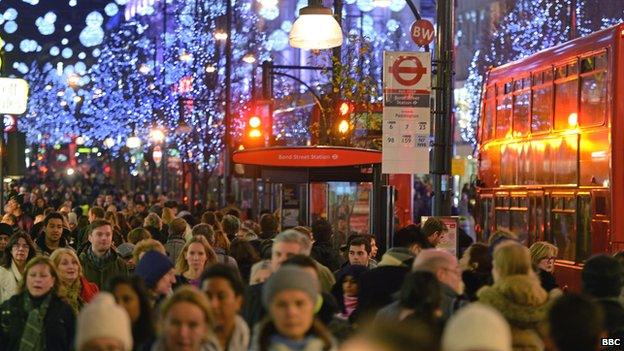Lowest ever winter deaths recorded
- Published

Last winter was warmer and milder than previous years
The lowest ever number of winter deaths was recorded last year, official figures for England and Wales show.
An estimated 18,200 excess winter deaths occurred in 2013-14, the lowest number since records began in 1950-51.
Last winter was notably warmer than in previous years and had a relatively mild flu season which contributed to the lower number of deaths.
The data compares deaths in winter months with averages in other seasons.
It showed 11.6% more people died last winter and elderly people were disproportionately affected.
Of the 18,200 excess deaths, 14,000 were in the over-75s.
Mild
Temperatures were 2C above average for December and January last year.
The ONS report said: "The peak in mortality for 2013-14 was much less pronounced than in previous years with 8% fewer mean [average] daily deaths during December and January compared to the five year average."
While excess winter deaths are linked to low temperatures, hypothermia is not the main cause.
Experience shows that the majority of such deaths are due to heart disease, stroke and respiratory illness.
However, the flu season was mild and the type of flu virus circulating last winter had a bigger impact on young adults than elderly people.
"The combination of mild winter temperatures and circulation of a subtype of influenza virus which predominantly impacts on young adults rather than the elderly may partly explain the low levels of excess winter mortality in 2013-14," the report said.
suggest this winter is likely to be relatively mild as well.
Historical trend
In 1950-51, an estimated 106,400 excess winter deaths were recorded, but the figures were closer to 60,000 for most of that decade.
There has been a consistent decline since then with deaths averaging around 50,000 in the 70s and 40,000 in the 80s.
Despite improvements, the UK tends to have higher winter mortality figures than colder countries such as Germany and Finland.
It is thought that people who live in countries with relatively mild winters have less insulated homes and are less likely to wear warm gear in cold weather.
Commenting on the report, Age UK's Caroline Abrahams, said: "It is truly shocking that thousands of older people are dying unnecessarily every winter because they cannot afford to keep warm.
"This is a national disgrace and a damning indictment of our failure to tackle the root cause of the problem: cold, energy-inefficient homes.
"Fewer older people died last year compared to recent years, but the winter was exceptionally mild: we must not be complacent about the cold homes which cause so many deaths among older people because who knows how bad this and future winters will be."
She called on the government to "bring all our housing up to a high energy efficiency standard".
- Published26 November 2013
- Published29 November 2012